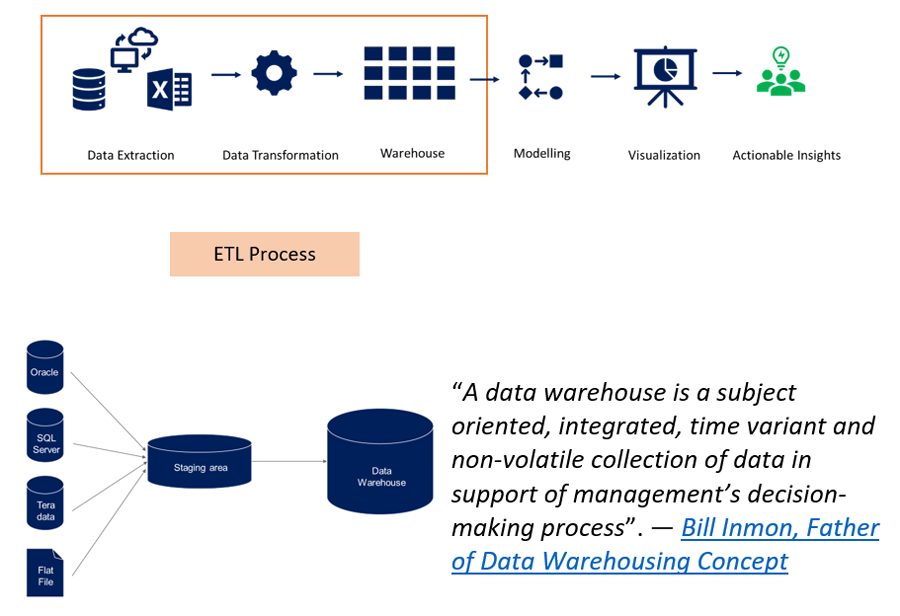Low-Code No-Code Platform Solutions for Extract, Transform, Load Processes
Low-code no-code platform ecosystems in your ETL processes significantly reduce time taken to arrive at insights.
Leaders across the organization can now run complex algorithms with minimal training and effort. The growing ecosystems of low-code no-code (LCNC) platforms eliminate high time to market.
LCNC is not new in the developer’s ecosystem, but now, it has entered the analytics ecosystem. There is a huge amount of data flowing from multiple sources across the organization, and managing that data to gain actionable insights is a complex process.
With LCNC, the time taken to generate actionable insights will decrease significantly, thus lowering the overcall cost, including time, resources, and delayed decisions, providing a competitive advantage to business leaders across functions in a company.
Extract, Transform, and Load
Extract, Transform, and Load (ETL) is the process of extracting data from multiple sources. It involves transforming the data into a format that can be used for further operations and then loading the data into a data warehouse. All these activities take place in the staging area. The task of extracting and loading the data into data warehouse appears easy but it requires a complex ETL process.

Through automation, the complex and time consuming process can be simplified with tools that take up the least amount of time and resources. This is where the magic of LCNC begins.
What is low-code and no-code?
Forrester - “Low Code platforms enable rapid delivery of business applications with a minimum of hand coding and minimal upfront investment in setup, training, and development”.
Gartner - “An application platform that supports rapid application development, one step deployment, execution, and management using declarative, high level programming abstractions, such as model driven and metadata based programming languages.”
With low-code, a workflow can be easily created by dragging and dropping visuals of existing coded blocks with minimum hand coding. On the other hand, no-code provides a development environment that allows you to build workflows quickly by dragging and dropping visuals of coded blocks without any hand coding required. LCNC platforms serve people from nontechnical backgrounds better.
Gartner estimates that low-code application development will account for more than 65% of all app development functions by the year 2024.
The main advantage of LCNC is that it brings speed to the process. The platform offers a high return on investment (ROI) with low risk, one click development platforms, and enables company leaders to address an urgent need.
Meeting the needs in the new normal
The COVID-19 pandemic has impacted many sectors , from small medium sized enterprises to large multinationals. It has made companies realize that their overall strategy should encompass analytics, digital, and cloud computing.
The pandemic has accelerated the adoption of LCNC platforms by eliminating the need for advanced development tools and providing quick access to skilled tech talent. LCNC platforms use existing resources to produce valuable outputs.
The competitive business landscape has forced companies to remain relevant. Platforms with no-code and rapid prototyping provide quick turnaround time and reduced costs for projects thanks to their plug n play capabilities.
Integration is one of the challenges companies might encounter when implementing an LCNC analytics platform. At times, integrating a low-code platform with organizational applications can be complex and challenging. This is especially true for companies using legacy platforms.
It may also be challenging if companies want to switch to a different framework or vendor, as the current vendor may offer a particular cloud-based ecosystem or may not allow developers to customize the underlying code.
How Wipro helps customers increase productivity with low-code, no-code
Wipro provides end-to-end support for customers' analytics strategy in the following ways:
Wipro’s analytics team meets the operational requirements of continuous operations by providing managed services, continuous improvement, and automation to existing operations.
They help customers build end to end analytics process and implement their analytics strategy, The Wipro analytics team will identify the best analytics platforms and make use of the LCNC ecosystem to reduce costs and boost productivity.
Wipro will provide day to day operations support to the team, 365 days a year, on a managed service basis, which includes project governance, management, and stakeholder communication.
Managed services benefit customers in the following ways:
Faster realization of value
In a post-COVID-19 world, the competitive landscape will continue to change due to still-unknown implications, which means digital operations, cloud computing, and analytics will play an even larger role than before. To stay relevant in the fast paced environment, LCNC software platforms are widely used to simplify ETL processes and data visualization, which helps data analysts, business intelligence engineers, and business leaders develop solutions in a much shorter period of time.
If you are interested in learning how Wipro is helping clients set up and manage analytics based on low-code no-code, connect with us. The Wipro team will assist you in your transformation journey with the right skills, technology, and infrastructure.
Suprav Patnaik
Practice Head - Data Analytics and Insights at Wipro Digital Operations and Platforms
Suprav currently leads Wipro's Data Analytics and Insights practice, leveraging comprehensive machine learning, and analytics solutions for solving business problems. He has 15 years of experience in the banking, financial services and insurance domain working in varied roles of service delivery, robotic process automation, and analytics.
Abhijit Gangurde
Presales Consultant at Wipro Limited
Abhijit supports Wipro’s Data and Insights practice by building data and analytics solutions for financial and non-financial customers. He brings marketing and analytics expertise and has an MBA in marketing from the Symbiosis Institute of Business Management, Pune.